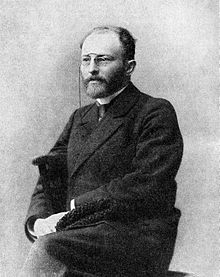Vikenty Veresayev
| Vikenty Veresaev | |
|---|---|
 |
|
| Born |
January 16, 1867 Tula, Russian Empire |
| Died | June 3, 1945 (aged 78) Moscow, Soviet Union |
| Genre | Fiction, autobiography, criticism, translation |
| Notable works |
Memoirs of a Physician In the War The Deadlock The Sisters |
|
|
|
| Signature |  |
| Website | |
| www |
|
Vikenty Vikentyevich Veresaev (Russian: Вике́нтий Вике́нтьевич Вереса́ев), (January 16, 1867 – June 3, 1945), was a Russian writer and medical doctor of Polish descent. His real last name was Smidovich.
Veresaev was born in Tula, where his father was a doctor. After graduating from the Tula gymnasium in 1884, he attended Saint Petersburg University, taking a master's degree in history in 1888. He then enrolled in University of Dorpat/Yuryev and successfully completed a course in medicine. His first work to appear in print was a collection of poems in 1885. His first short story, The Puzzle, was published in 1887. In 1890 he toured the coal mines of Donetsk with his brother, gathering material for a collection of sketches called The Underground Kingdom, detailing the struggles and hardships of the exploited miners, which he published in 1892.
During the 1890s, Veresaev joined a group known as the Legal Marxists, and he published works in such journals as New Word, Inception and Life. During this period he wrote a cycle of works concerning the intelligentsia’s frame of mind at the turn of the 20th century, including the novella Without a Road (1895), the short story The Craze (1898) and the novella At the Turning Point (1902). He also wrote about the difficult position of the Russian peasantry, such as in the short story Lizar (1899) which was praised by Vladimir Lenin. His short story On a Dead-end Road (1896) and the novella Two Ends (1899–1903) were devoted to the life of the workers.
During the first decade of the 20th century Veresaev was a member of the Sreda (Wednesday) literary group and published his works in Maxim Gorky's Znanie collections. He published his most successful book, the semi-autobiographical Memoirs of a Physician in 1901, in which he sharply criticized the system of Russian medical education. In April 1901 he was dismissed from the hospital where he'd been working because of his political views, and was forbidden to live in Moscow or Saint Petersburg for a period of two years.
...
Wikipedia
